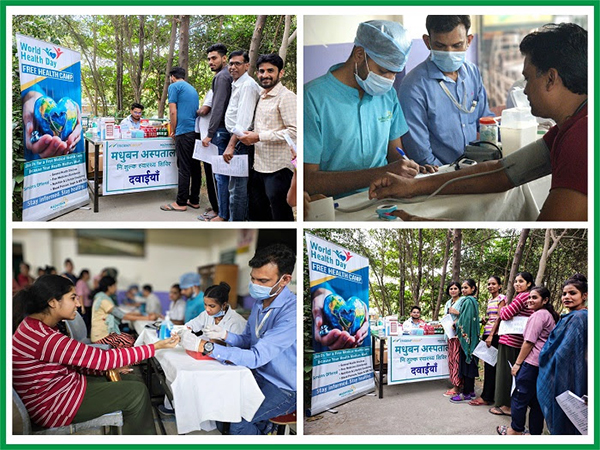Eid-ul-Fitr 2021: Try these 5 binge-worthy delicacies to treat your taste buds
May 12, 2021

New Delhi [India], May 12 : After a month of fasting, praying, and engaging in humanitarian activities such as feeding the underprivileged during the holy month of Ramzan, falls the auspicious occasion of Eid-ul-Fitr.
Ramzan is all about the breaking of the dawn-to-dusk fast. This year, Ramzan began on April 13 and ended on May 12. This annual observance is regarded as one of the five pillars of Islam. It lasts between one sighting of the crescent moon and the next. It is said that Ramzan is the commemoration of Prophet Muhammad's first revelation.
The celebration of Eid-ul-Fitr, which comes after the holy month of Ramzan, falls on the first day of the month of Shawwal, and no fast is observed on that day.
This year, the calendar lists Eid ul-Fitr on May 12. Generally, the Islamic community in India celebrates the festival a day later than in Saudi Arabia. Thus, Eid ul-Fitr will be celebrated on May 13 in India.
On the occasion of Eid-ul-Fitr, people wake up early in the morning, chant salat ul-fajr (daily prayers), take a bath, wear new clothes, and put ittar (perfume). It is a custom to eat a hearty breakfast before people perform the special congregational prayers on the special day.
Many Muslims also recite the Takbir, which is the declaration of faith, on their way to the prayer ground and take part in Zakat al-Fitr (charitable contributions).
The celebration often comprises a wide gamut of sweet delicacies such as sheer khurma, biryani, and kebabs. Muslims across the world offer their prayers to the almighty and then prepare for a lavish Eid feast featuring scrumptious delicacies and drinks.
This Eid, if you have plans to prepare some lip-smacking dishes, we have got you all covered! We bring you a list of 5 scrumptious delicacies suggested by Ex Radisson Chef Anil Dahiya to savour on the pious festival of Eid.
500 gms lamb meat try to take the tender parts with bones
500 gms basmati rice
5 tbsp ghee / clarified butter
3 onions finely chopped
4 black cardamom
3 green cardamom
5 - 6 black peppercorn
1-inch stick cinnamon
6 - 8 cloves
1 tsp fennel seeds1 tsp kewra essence
1/2 cup milk
4 - 5 saffron strands
Salt to taste
2 onion very finely chopped
3 tbsp ginger garlic paste
1 tsp coriander powder
1 tsp red chilli powder
1 tsp garam masala powder
Juice of 1 lime
1 cup yogurt
Salt to taste
Mix all ingredients of marination in a clean bowl and add in the mutton pieces and give it a mix. Let it marinate for at least 6 hours or overnight. Next, wash the basmati rice and soak the rice in water for at least 30 minutes - 1 hour and drain them after the said time.
Take a pan and boil the whole spices with 5 cups of water. Let it rest for 20 minutes and then strain. Heat ghee in a large pan, and then add in the rice. Cook for 3 to 5 minutes or till rice turns opaque white. To add colour and fragrance, crush and add in 2 saffron strands. Pour in flavoured water too. Bring the rice to a boil, cover, and allow it to simmer for 3-5 minutes. Switch off the flame and let the rice rest for 5 minutes. This will allow the rice to absorb the moisture. In another heavy-bottomed pan add ghee, drop in chopped onions and saute till they turn translucent. Add in the marinated mutton. Now stir and cook the meat for a few minutes.
Cover with the lid and simmer it for another half an hour. Take a pot and lay a layer of rice. Add in some of the mutton pieces. Repeat this alternate layering of rice and mutton pieces. Finish with a layer of rice on top. In another wok or pan warm the milk with cardamom pods. Crush and add the saffron. Pour in some drops of Kewra water on top of the finished biryani layers. Now cover with a lid and seal the vessel by applying a dough made with wheat flour or flour around the lid, all the way around. Cook on very low flame for about half an hour. Remove the vessel from the flame and break the seal. Your lip-smacking Lucknowi Mutton Biryani is ready to get served!
Lamb 500 grams
Onion 4 medium
Ginger 2 inch piece
Split Bengal gram (chana dal) 2/3 cups
Peppercorns 10-12
Fennel seeds (saunf) 2 tablespoons
Onion seeds (kalonji) 1 teaspoon
Coriander seeds 1 tablespoon
Fresh coriander leaves 1/2 bunch
Ghee 2/3 cups
Green cardamom powder 1/2 teaspoon
Clove powder 1/2 teaspoon
Cinnamon powder 1/2 teaspoon
Salt to taste
Yoghurt 1/2 cup
Egg white 1
Wash and drain lamb mince and keep it aside. Then peel, wash and roughly chop three onions and finely chop the remaining two. Peel, wash and finely chop the ginger. Take a pan and roast chana dal and grind it into powder. Lightly crush peppercorns, fennel seeds and onion seeds too. Crush coriander seeds separately.
Clean, wash and chop coriander leaves. Take a pan and heat one tablespoon of ghee and fry roughly chopped onions till they turn brown. Cool and grind to a paste. Mix this paste with the minced meat. In another pan, heat three tablespoons of ghee and add the mince-onion mixture. Cover it with a lid, remove it from heat and shake well twice or thrice. Place the pan on low heat and uncover it after two minutes. Add half a cup of water, coriander seeds and mix well. Continue cooking by stirring the ingredients frequently till all the water gets absorbed. In a separate pan, heat one tablespoon of ghee.
Then add chopped ginger, finely chopped onion, roasted chana dal powder, cardamom powder, clove powder, cinnamon powder and crushed peppercorns-fennel seeds-onion seeds. Finally, add the mince, salt and mix well. Then beat yogurt with egg white and mix into the mince mixture. Shape this mixture into flat circular croquettes, these should be one and a half inches in diameter and half an inch thick. In a shallow frying pan, heat ghee and fry kababs till golden. Take them out into an absorbent paper.
Serve after adding chopped coriander leaves, and Bon Appetit!
1 1/2 cup soaked basmati rice
1 pinch soaked saffron
1/4 cup raisins
4 green cardamom
2 inches cinnamon stick
4 tablespoon ghee
1 teaspoon lemon juice
3 cup water
1 cup sugar
1/4 cup cashews
2 tablespoons chopped coconut
3 clove
1 bay leaf
100 gm grated khoya
1/4 teaspoon edible food colour
Soak rice and cook in a heavy-bottomed pan along with the above-mentioned spices. In another heavy-bottomed pan, bring enough water to boil. Add soaked rice, cardamom, cloves, cinnamon and bay leaf. Cook until rice is 80 per cent done. Do not cook it beyond 80 per cent, and then strain the boiled rice, spread it on the plate and keep it aside for few minutes.
Do not discard whole spices from the rice. Take a separate pan and fry dry fruits along with sugar and saffron. In another heavy-bottomed pan, heat ghee or butter. Add coconut, cashews and raisins, fry until they are light golden brown. Keep the flame low and make sure they don't get burn. Add sugar and saffron water. Cook until sugar melts well. Add yellow edible food colour and lemon juice. Mix and allow it to boil for 1 to 2 minutes. Mix rice and dry fruits. Now add rice and gently mix and make sure that all the rice coats well with sugar-saffron mixture. Cook for a minute on moderate flame.
Sprinkle khoya all over the rice, cover the pan with a tight lid and simmer on a very low flame for 15 minutes. Once done, gently fluff up the rice with a fork.
If you're bored of that regular savoury pulao and want to try something new, then this is your go-to recipe as it is sweet in taste. Transfer the pulao to a serving bowl and enjoy!
2 cup vermicelli
1 cup condensed milk
1 cup milk
1/4 cup pistachios
1/4 cup chopped almonds
1 tablespoon ghee
50 gm khoya
1 teaspoon powdered green cardamom
3 tablespoon raisins
Take a wok and roast seviyan or vermicelli in ghee. Make sure you heat the ghee in a deep bottomed pan. Add the seviyan and roast till fragrant. Keep the flame low. Once done, remove from heat and keep aside.
In a saucepan, boil milk and dissolve sugar in it. Add the chopped nuts and cook for 2 to 3 minutes. Now put in the condensed milk and cook on low flame till it mixes well with the milk. Add seviyan to the milk and cook until the dish is completely dry. At last, grate the khoya and add it to the milk. Cook till the mixture gets thick and add the seviyan and cook for another 5 minutes or until the ingredients get dry. Add the powdered cardamom and mix well.
Chef's tip: You must always add cardamom towards the end or it may lose the fragrance due to heat. Decorate with chopped nuts and serve cold. Enjoy!
3 litres Milk, (use 2 per cent fat milk)
1/2 cup Sugar
1 teaspoon Fennel seeds (Saunf), powdered
1/4 cup Gulkand
1/4 cup Whole Almonds (Badam), powdered
1 teaspoon Gulkand
1/2 teaspoon Betel Nut (Supari)
First, we need to condense the milk and for the process- heat milk in a heavy-bottomed saucepan and bring the milk to a boil. Once the milk comes to a boil, turn the heat to low and simmer the milk with almost continuous stirring and reduce the milk to more than half its quantity. After it is reduced to about more than half of its quantity, stir in the sugar until it dissolves completely.
Finally mix in the fennel seed powder, almond powder saffron and gulkand into the Kulfi milk mixture. Then switch off the heat and allow the Gulkand Kulfi mixture to cool completely. Pour the Gulkand Kulfi mixture in the moulds until 3/4th full, seal them airtight and freeze them in the refrigerator.
The Gulkand Kulfi takes at least fifteen hours or more to freeze. One can refresh childhood memories by getting wooden ice cream sticks for the kulfi or can freeze them in popsicle jars. Once frozen you can run the Gulkand Kulfi moulds underwater to enable easy release onto the plate and serve.
Your relishing sweet dish is ready to be savoured on! Now that we have got you all covered, feast and indulge in your favourite delicacies for this Eid and stay safe.




















